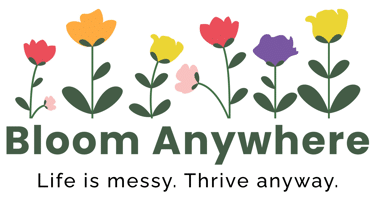Did you ever notice that when you decide to do something—make a serious commitment to change—suddenly, something else is fighting for your attention? You’re going to finally launch that small business or side hustle, but you’re suddenly so busy, you don’t have the energy or time. You’re going to start eating more healthfully or cut back on the after-work cocktails, but there’s a holiday or birthday coming up, so why set yourself up for failure?
Over the years, I’ve named this phenomenon “the test” in my head. It invariably surfaces when I have decided to make a change or embark on a new goal. Sometimes, I recognize it and overcome it. And sometimes it derails me from what I want to do. Let’s just say that the best way for me to find a juicy new project is to try to devote time to finishing my novel or taking a vacation. It never fails.
A test by another name
Recently, when I was fighting against several “tests” as I began to seriously devote time to Bloom Anywhere, I reached out to my longtime friend, Nancy Ring, who is a licensed clinical social worker and therapist. I texted her my description of the phenomenon and asked her if there was a name in psychology for it.
“I’d call it avoidance. More specifically, emotional avoidance. As it relates to the emotional overwhelm of the prospective decision,” she replied.
Oof. Avoidance? My first reaction (internally) was, “Nah.” I’m not an “avoider.” I’m more of a “run-head-firster.” But, lately, I’ve been trying to sit with ideas for a bit before I react and, the more I thought about this, the more it made sense.
When we decide to change, we make ourselves vulnerable.
- What if we fail?
- What if the outcome isn’t what we think it is going to be?
- What our imposter syndrome is revealed to be true?
- What if . . . ?
We often make changes because we’re motivated by something that is making us unhappy, something we want to achieve, or both. And it’s very possible we will fall flat on our face when we try.
Then, again, what happens if you don’t do it? What happens if this voice that’s been nudging you to try something new or change something you don’t like never gets the chance to see what’s possible? How much will you regret never knowing what’s possible?
Get help passing your test
Here’s a solution that’s working for me: when I’m excited about my idea or goal, I write down why. (Yes, more writing.) I write about the vision and what I hope will happen. I map out all of the reasons I can think of to keep going with it. I think these types of touchstones are important. They can help keep us going, even when it’s challenging. Sometimes, I’ll share them with my personal advisory board with a request that they help keep me accountable.
How do you stay on track with your goals? What has worked for you in not letting them derail you? Please reach out to gwen@gwenmoran.com, and I may include your comments in a future post.
